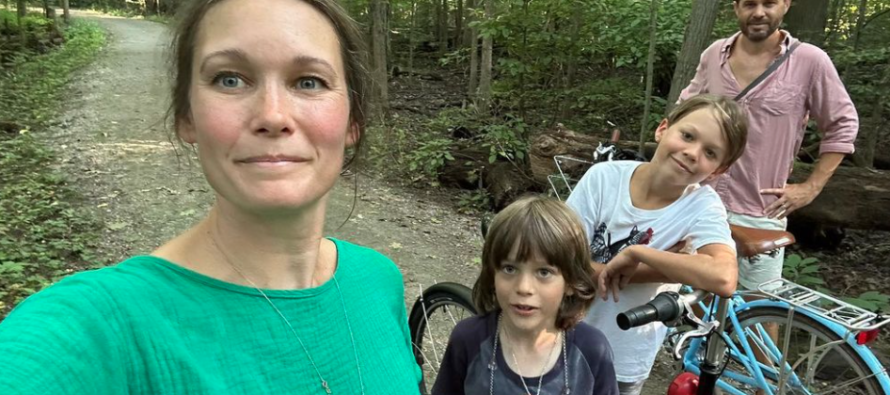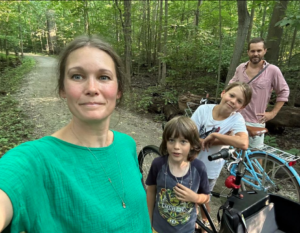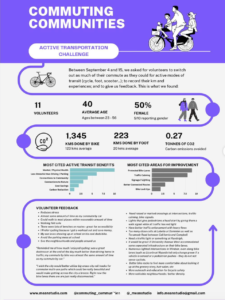Local family aims to make Windsor active commuter-friendly city

By Dale Cabuquin
She feels the breeze of fresh air against her face and hands as she pedals her way to her destination.
Crystal Waddell has no concerns during her bike ride in Detroit as she heads to work at Wayne State University to teach architecture and interior design.
A smile spreads across her face as she engages with other bikers on the way and enjoys the views from her bus and bike ride to Wayne State University. Her commute takes her about an hour by bus and bike for a total of 14 kilometres.
“I didn’t realize how easy it is to take my bike across the U.S. border from Optimist Park all the way to Wayne State University,” Waddell says. “It was a pretty painless experience and I lowered my carbon footprint.”
In Detroit, she says she has nothing to worry about since the protected bike lanes cover her route from the bus stop to work.
But this is not the case in Windsor. According to Waddell, the municipal government has got some work to do.

The Waddell-Shankland household spent their first day of commuting challenge biking in Devonwood Conservation Area on Sept. 2. Photo courtesy of: Crystal Waddel/Instagram.
Active Commuting Community
The Waddell-Shankland family, together with their two boys Hugh and Arthur, are one of the household finalists for Canadian Geographic’s Live Net Zero competition.
Live Net Zero is designed to reduce carbon emissions. There are eight household finalists across Canada chosen to compete in challenges for 14 weeks and whoever gets a near-zero carbon emission receives the winning prize of $50,000.
The family are active commuters and Mother Nature advocates. Because they primarily utilize active transportation to get around to most places, they were hoping to use this opportunity to engage with the community. As such, they created an active commuting challenge.
Participants had to take photos of areas for improvement and log their data.
“We’re putting together a report that we can share with the city councillors and the broader community to try and get more people active on the street cycling, because I think the more people that you have on the street cycling, the more awareness there is,” Waddell says.
11 volunteers in Windsor participated in the challenge between Sept. 4 and 15. They switched their common vehicle-oriented commutes to work and to run errands to active modes of transportation such as cycling, walking, and use of scooters.
“We want to get that report out soon in the next weeks and share around and see if we can get some more traction and some more response,” Waddell says. “It provides more information from active transit commuters. It provides the city with some statistics and knowing that you know where there are problem areas for people who are on the ground doing this every day. So, it just helps push to get better infrastructure.”
Approximately 1,345 km for biking and 223 km of walking were recorded from their recent findings.
A total of 0.27 tonnes of carbon emissions were avoided which is equivalent to 115 litres of gasoline saved.
According to Statistics Canada, 12.6 million Canadians commute to work by car.
The average commute is 8.7 km one way, and it produces 3.6 kg of carbon dioxide emission. It is equivalent to 1,534 litres of gasoline consumed.
Some of the problems cited by active commuting participants are:
- Protected bike lanes
- Signages and lighting
- Better connected routes
According to Waddell, the Active Transportation Master Plan created by the city has great objectives. However, she thought the city needed to continue engaging with active commuters across the city to address specific problem areas and ensure the right moves.
“Both drivers and cyclists alike feel a lot more comfortable and safer with protected or separated bike lanes,” Waddell says.

The summary of the commuting communities challenge between Sept. 4 and 15. Photo courtesy: Commuting Communities Instagram page.
Biking, the preferred way to go
The Waddell-Shankland family sold their car in 2019 because of their love for the environment and keeping the whole family healthy. Since then, they find it best to use different methods of getting around and out of town, which mainly includes biking, walking, use of public transportation, car share and car rental.
Waddell says electric cars are what they rent when possible.
The first challenge in Live Net Zero is commuting. The rule is – to drive less and decarbonize the rides from one place to another.
“So as a family, we did a few things rather than putting the kids on the bus,” Luke Shankland says. “We rode the bikes with them a number of days and they loved that. Rather than renting a car and going somewhere out of town, we decided to take the bus and bikes and went over to Detroit and had a really great time at the festival there and really enjoyed that.”
In September, the family organized a small event for four families and seven kids in the community. They went to Windsor Bike Kitchen for the kids to learn about maintenance, safety and the importance of bikes.
“It was a positive morning for our future generation commuters,” Waddell says. “It was great to engage with our communities. I hope we inspired some people to change. It’s really about freedom, more livable, greener communities, which is all part of the net zero process.”


